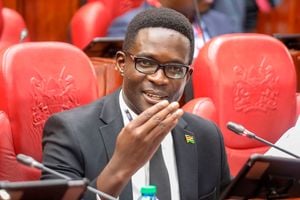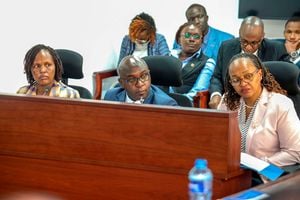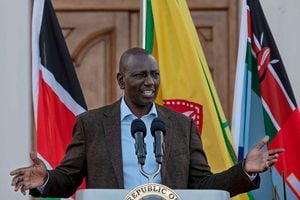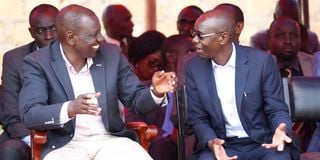
President William Ruto chats with former West Mugirango MP Vincent Kemosi during a past event at Nyamirang'a grounds in Nyamira County.
When former West Mugirango MP Vincent Kemosi declined his nomination as Kenya's High Commissioner to Ghana, he cited personal reasons.
He explained that he would not want to appear before the vetting committee to avoid wasting the parliamentarians time.
"I will not appear before the said committee at the time and venue specified for approval hearing. This has been occasioned by personal and compelling family matters which after taking into consideration will not allow me to take up the position of High Commissioner to Ghana as nominated by His Excellency President William Ruto on March 9, 2024," Mr Kemose stated in the letter read by Belgut MP Nelson Koech, the chair of the committee.
But Mr Kemosi’s declining a presidential job offer isn’t the first one, as history is littered with such cases, leaving the appointing authority dumbfounded, sometimes angry, and friends, and those who are not as close, questioning the motive.
Sometimes, nominees decline offers when the roles are incoherent with their ambitions. This was the case when Joseph Nkaissery turned down a job offer from President Mwai Kibaki.
When President Kibaki suffered a humiliating defeat in the 2005 referendum, he reacted by sacking all “No”-affiliated ministers. Subsequently, he worked without a full Cabinet for two weeks before he reshuffled his Cabinet.
In the book, The General and I, Joseph Nkaissery’s widow Helen writes that she and the kate were seated in their living room in Karen when they heard the General’s name being mentioned on TV. He had just been named an Assistant Minister in the Ministry of Energy, she writes.
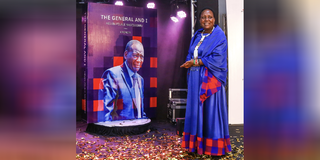
Ms Helen Pilale Nkaissery during the unveiling of her book The General and I.
“Ala! How? I am not in Narc. No. But the party and Uhuru didn’t tell me that he has given out my name. What is this I am being given? If they wanted me to help in a government, if they really are genuine, then they would have given me something to do with security,” Nkaissery remarked.
Surprised, he called Uhuru who at the time was his party leader and confirmed that President Kibaki had not consulted him before announcing that appointment. Nkaissery turned down the offer, becoming the first person to turn down a presidential appointment in President Kibaki era.
He called his contacts in the media as he explained to me, “You know, Mummy, I am not taking this thing. First of all, my party leader hajaambiwa (has not been consulted). Secondly, Assistant Minister for Oil and Petroleum? What do I know about this? Is it just that they want to weaken this party that I belong to?” he told his wife.
The following morning, 11 other opposition MPs announced that they had rejected Kibaki’s call to serve in his government.
“General was not out to set a precedent, he just needed to draw a clear boundary in political party affairs. And he was very loyal. That was his nature. He was not going to walk out on Kanu for perks and prestige that would benefit him individually and leave his party depleted,” Helen wrote of his husband’s decision.
One of the rarest presidential appointment rejections was in December 2005 when then Ford-Kenya leader Musikari Kombo led its members and 15 would-be assistant ministers in rejecting an invitation to join the Cabinet after a constitutional referendum in which Kibaki was humiliated by his own ministers to a defeat. Mr Kombo, who had been retained as Local Government Minister, said his party had been "short-changed."

Former Ford-Kenya leader Musikari Kombo.
"We have been surprised and disappointed that these appointments were made without consulting FORD-Kenya leaders and without regard to the views of its members," Mr Kombo said.
In the same breathe, Orwa Ojode, who was a member of the Liberal Democratic Party (LDP) who had been appointed to the environment portfolio, also declined the offer. He complained that important members of his party had been left out of the Cabinet and that his Nyanza backyard was not adequately represented in the government.
About 15 assistant ministers also rejected appointments, citing various reasons.
Even in President Daniel Moi’s era, there were instances of nominee turning down offers as did Philip Mbithi, the former don and one-time University of Nairobi vice-chancellor, who served in Moi’s administration as the head of civil service and secretary to the Cabinet. This was the most powerful position to ever exist, and he reported directly to Moi.
On his last day in government, however, after discussing the expected reshuffle in government with Moi in the morning, Prof Mbithi tuned his radio at one o’clock only to hear his name first in the list, and where he had been demoted to be Kenya’s representative to the East African Community headquarters in Arusha, a job he declined.
President Uhuru also suffered setbacks when some of his nominees declined his appointments.
Former Mandera Central MP and President Kenyatta’s Constitutional and Legal Affairs advisor, Abdikadir Mohamed, in 2018 declined to take up his new posting as Kenya’s ambassador to South Korea.
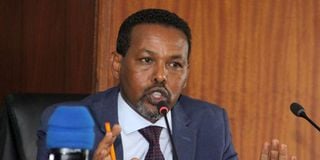
Lawyer Abdikadir Mohamed.
He had been nominated by the retired president on February 13 but rejected the offer. It was understood that the personal reasons, which he cited as grounds for declining the job, included concern for his young family – with children at delicate stages of their life, career mismatch fears and his passion for private sector, a daily newspaper reported.
Former Director-General of the Kenya Rural Roads Authority, Engineer John Okuna Ogango were among the four nominees who rejected ambassadorial offers by the retired president. He cited personal reasons as grounds for declining to be vetted by the parliamentary committee on Foreign Affairs and Defence.
The former Building Bridges Initiative (BBI) co-chair, Dennis Waweru, who was appointed as Kenya’s Consul-General in the Democratic Republic of Congo, also declined ambassadorial positions to join former Prime Minister Raila Odinga's campaign team.
At the same time, the former finance minister, Chris Okemo, also rejected an appointment to be a board member of the Kenya Seed Company.
His appointment courted controversy and backlash for the appointing authority. At the time, he was facing extradition, money laundering and misconduct in public office charges in the United Kingdom when the appointment was made.
"I wish to sincerely thank His Excellency the President and the government for considering me for the appointment. However, considering my case seeking to annul and quash the frivolous and baseless request for extradition, this will not be an opportune time to enter public service,” Mr Okemo said when declining the offer.
On the face of it, political analyst and governance expert Javas Bigambo argues that to be worthy of being nominated by the president for ambassadorial role to a peer nation such as Ghana, the nominee must have the trust of the Head of State.
“It is possible that given the convivial relations the nominee and the president have, the nominee may have expressed to the president a desire of a specific kind of appointment,” said Mr Bigambo.
Whereas there are many ways to being appointed or nominated for a role from the State House, to a large extent, the nominees sometimes lobby for jobs indirectly or directly.
The practice is common in African jurisdictions such as Kenya, University of Nairobi lecturer Prof Winnie Mitullah explains, that just as it happens before elections when lists of individuals and their roles in the cabinet, are always floated around.
This, in most scenarios, is always considered rewards because a nominee has “been affiliated with the president and his political party, business or so many other things”, and “they need to be given a job.”
However, the rejection of such nomination as is the case of Mr Kemosi unearths a number of things. What comes to the surface is that the nominee got the news of his nomination by surprise, explains Mr Bigambo, or that maybe before the nomination there may have never been very clear consultations.
But, being a politician, the nominee perhaps, suffers certain fears. Looking forward to remain in the political field, a nominee may be fearful that in taking a role based outside the country, they are likely to lose touch with the ground between now and the next election or when his tour of duty ends.
Mr Bigambo faulted Mr Kemosi for declining the offer by way of letter to the committee saying it “leaves a very bad taste in the mouth.” That it would have been more honourable to convey the same to the Head of State who is the appointing or nominating authority “so that the nominating authority varies the offer to another,” he explains.
But “it is a very good example that it should not be automatic that a presidential appointment would end up in one taking up the job,” argues Prof Mitullah.
According to her, there is a feeling that it is honourable to be appointed by the president so as to take anything that a president gives you. But it should not always be the case.
However, individuals decline appointments for various reasons, says Prof Gitile Naitula a professor of management and governance, which may include philosophical difference, if the regime does not meet their “intergrity quotient” or if they “actually lose by accepting the offer” when they are business persons and the role prohibits or hinders them from the continuing with their businesses.


